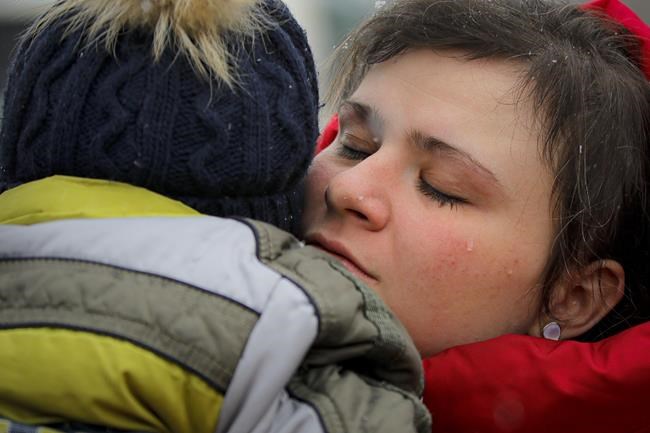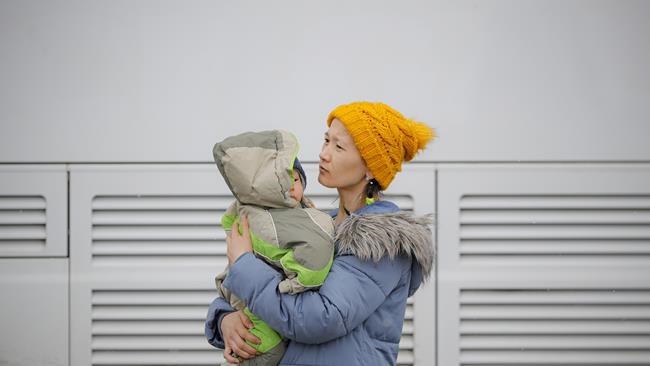War silenced violin for refugee as 1.7M have fled Ukraine
Advertisement
Read this article for free:
or
Already have an account? Log in here »
To continue reading, please subscribe:
Monthly Digital Subscription
$0 for the first 4 weeks*
- Enjoy unlimited reading on winnipegfreepress.com
- Read the E-Edition, our digital replica newspaper
- Access News Break, our award-winning app
- Play interactive puzzles
*No charge for 4 weeks then price increases to the regular rate of $19.00 plus GST every four weeks. Offer available to new and qualified returning subscribers only. Cancel any time.
Monthly Digital Subscription
$4.75/week*
- Enjoy unlimited reading on winnipegfreepress.com
- Read the E-Edition, our digital replica newspaper
- Access News Break, our award-winning app
- Play interactive puzzles
*Billed as $19 plus GST every four weeks. Cancel any time.
To continue reading, please subscribe:
Add Free Press access to your Brandon Sun subscription for only an additional
$1 for the first 4 weeks*
*Your next subscription payment will increase by $1.00 and you will be charged $16.99 plus GST for four weeks. After four weeks, your payment will increase to $23.99 plus GST every four weeks.
Read unlimited articles for free today:
or
Already have an account? Log in here »
Hey there, time traveller!
This article was published 07/03/2022 (1379 days ago), so information in it may no longer be current.
ZAHONY, Hungary (AP) — The violin was so beloved by Myroslava Sherbina it was the one item she took as she fled Ukraine, along with the clothes she wore. But the instrument has remained silent since the start of Russia’s invasion of her country.
“I didn’t want to play so I could hear the sirens and we could go to the bomb shelter,” the 20-year-old Sherbina said.
She is among the more than 1.7 million people who have fled Ukraine in what the United Nations calls Europe’s fastest-growing refugee crisis since World War II. The number is up from 1.5 million on Sunday, the U.N. refugee agency said.

Sherbina spoke at a train station in Hungary, one of dozens of musicians with the Youth Symphony Orchestra of Ukraine who are now refugees. They were on their way to Slovenia as part of a joint evacuation mission with a Slovenian orchestra.
Cellos, violins, violas and other instruments lay on the train platform next to their young and disoriented owners. Hours-long train delays caused by the surge of Ukrainians toward borders meant that about 30 musicians were still unaccounted for.
“There’s a group of about 90 people coming to this particular train station,” said Uros Dokl, a volunteer from Slovenia who came the 665 kilometers (413 miles) to greet the orchestra members. “Not all of them are members of the orchestra, but they are young people playing music, and young people of course need guidance.”
Sherbina, the violin player, said she’s confident the war in Ukraine will end soon and she’ll return home. Until then, she’ll refine her skills in Slovenia, a country she’s never visited.
“I want to feel safe so I can practice, and not think that a bomb can fall and ruin my house,” she said.
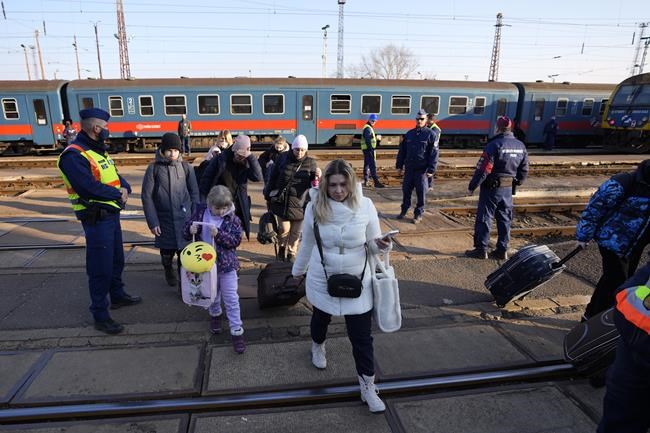
Some 4 million people may flee Ukraine if Russia’s offensive continues, the U.N. has said. On Monday, European Union foreign affairs policy chief Josep Borrell urged the mobilization of “all the resources” of the 27-nation bloc to help countries welcoming them.
Two Czech army convoys were on the way to neighboring Slovakia to help. “We didn’t have to think twice and immediately met the Slovak request,” Czech Defense Minister Jana Cernochova said. The temporary base will be able to accommodate up to 400 people.
A cardinal dispatched by Pope Francis on a mission to promote peace traveled to the Polish-Ukrainian border to meet with refugees. He will highlight “the sad similarity between the Ukrainians’ sufferings and the protracted conflicts that no longer attract the world’s attention,” the Vatican said, citing the pope’s frequent denunciation of suffering in wars in Ethiopia, Yemen and Syria.
Uncertainty and relief continued along the border among the thousands of arriving Ukrainians. Many were wrapped in blankets. Some held small children. They sought the basic necessities: food, shelter, sleep, support.
Under a canopy next to the train station in the Hungarian border town of Zahony, Tamas Marghescu stirred a cauldron of traditional meat stew. As an outdoorsman and the Hungary director for the International Council for Game and Wildlife Conservation, he called the meal well-suited for those who shivered in line for hours at the border.

“When you’re at home watching the news, you feel so helpless,” his wife, Ilona, said. “It’s … important for people when they come off those trains to have somebody smiling at them and to know that there are people here that care.”
The couple said they felt a responsibility to help those who fled. Ilona’s parents left Hungary for Australia during World War II. Marghescu’s family twice fled Soviet domination, after the war in 1948 and again after the brutal Soviet repression of the 1956 Hungarian Revolution.
“My parents are still telling me stories about when they were refugees and they were looked after,” Marghescu said, His wildlife organization has set up similar outdoor kitchens at the Polish, Slovakian and Romanian borders with Ukraine.
“It’s a traditional meal and it’s cooked with love,” his wife said.
In Moldova, some families opened homes to refugees. “It was a natural and beautiful process,” said Sabina Nadejdin, who hosts pregnant Anastacsia Luybimova and her three small children. Like most other men, Luybimova’s husband stayed behind in Ukraine. Lifting her hand from her belly, she showed a heart tattoo she and her husband got on their ring fingers when they married.
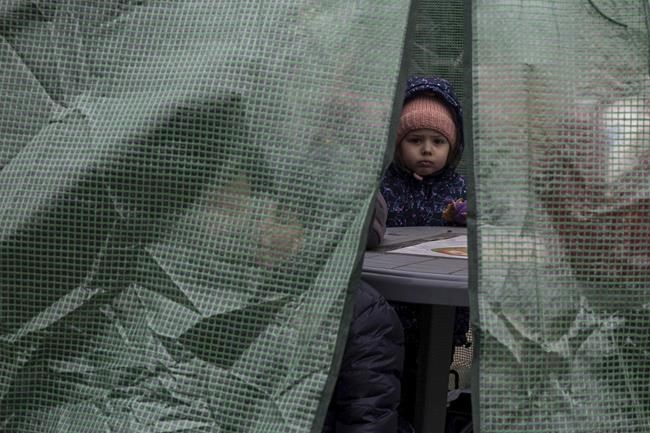
Poland, where more than 1 million refugees have arrived, on Monday approved legislation offering them financial help and allowing them to stay legally in the country for 18 months. Helping the Ukrainians is the most important challenge Poland has faced in decades, Prime Minister Mateusz Morawiecki said, and efforts “cannot be only spontaneous.”
At the Przemysl train station near the Medyka border crossing, the main point of arrival in Poland, the hall was packed and a banner in Ukrainian read, “Here, you are safe.”
A 17-year-old Polish volunteer, Zuzana Koseva, described the refugees as “just very, very tired, terrified and confused because they don’t know what to expect.”
The volunteers were trying to organize food and a warm tent, she said. She was moved by the exhausted mothers and the small, sometimes bewildered, children.
“They are happy with one sweet, so that’s just amazing,” Koseva said.
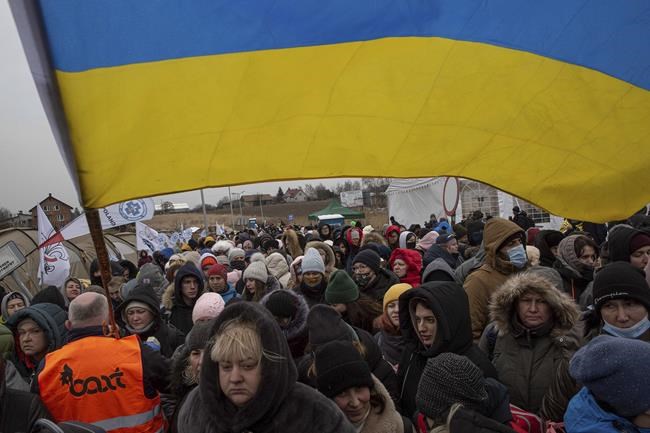
One mother held a child to her chest and, closing her eyes in what might be prayer, touched their foreheads together.
___
Associated Press journalists around Europe contributed to this report.
___
Follow the AP’s coverage of the Ukraine crisis at https://apnews.com/hub/russia-ukraine
